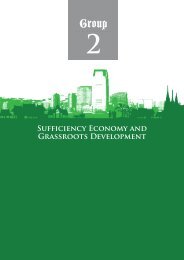Conflict, Legitimacy and Government Reform: Equitable Allocation of ...
Conflict, Legitimacy and Government Reform: Equitable Allocation of ...
Conflict, Legitimacy and Government Reform: Equitable Allocation of ...
You also want an ePaper? Increase the reach of your titles
YUMPU automatically turns print PDFs into web optimized ePapers that Google loves.
62 KPI Congress XI<br />
One common contention is many Thais are still poor <strong>and</strong> not<br />
educated well enough to know what’s right or what’s wrong. Therefore,<br />
they cannot make up their own minds <strong>and</strong> may be misled easily.<br />
However, as time goes by, such thinking is being criticized more <strong>and</strong><br />
more that it is used to justify preservation <strong>of</strong> existing inequality so that<br />
people will accept a government controlled by a few persons that has<br />
supreme power.<br />
Another criticism is the democratic system heeds opinions <strong>of</strong> the<br />
majority <strong>and</strong> will likely end up with mob rule. This issue has been taken<br />
up <strong>and</strong> a solution is there already. Most countries prescribe rules in their<br />
constitutions to prevent the majority from harming the minority <strong>and</strong><br />
adequately protect the minority.<br />
Some people criticize democracy by saying that it provides<br />
opportunities for vote-buying by politicians. Regarding this issue,<br />
experiences <strong>of</strong> developed countries can shed light on this. Once people’s<br />
income rose, 500 or 1,000 baht <strong>of</strong>fered to buy a vote would mean<br />
nothing to them. Eventually, vote-buying will disappear.<br />
Nevertheless, criticism still goes on <strong>and</strong> on, saying in a democratic<br />
system, before important matters are resolved, opinions <strong>of</strong> various groups<br />
must be heeded <strong>and</strong> an agreement must be reached before determining<br />
further action. This process is more time-consuming than under an<br />
authoritarian regime where power is in the h<strong>and</strong>s <strong>of</strong> one person.<br />
Consequently, democracy may deter economic development which<br />
requires quick decisions. Regarding this issue, available studies may not<br />
firmly conclude that democracy is detrimental to economic development<br />
while many countries that have grown dramatically do not have<br />
democracy.<br />
However, it is clearly evident that many countries in the world that<br />
have enjoyed satisfactory economic growth rates <strong>and</strong> stable political<br />
conditions have democratic governments.<br />
Even in our own experiences, Thail<strong>and</strong> enjoyed the fastest economic<br />
growth rate under a democratic regime. During 1986-1996, average














